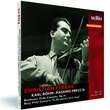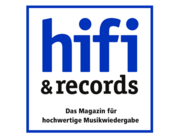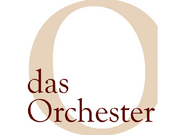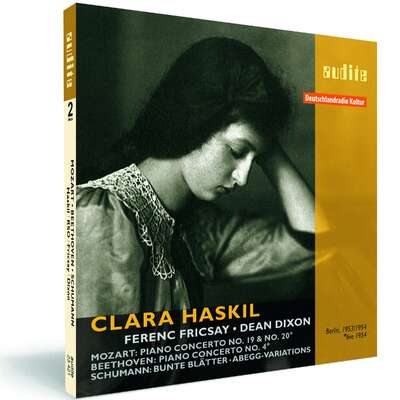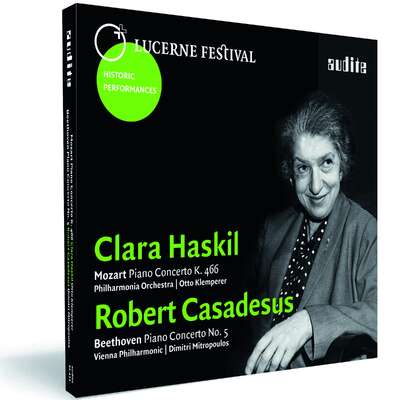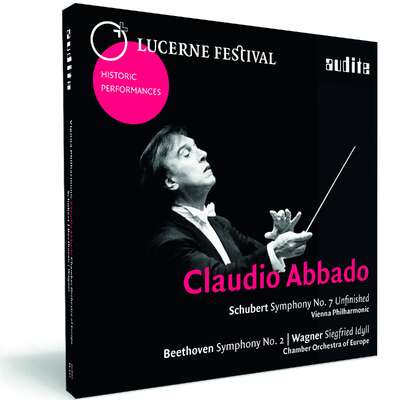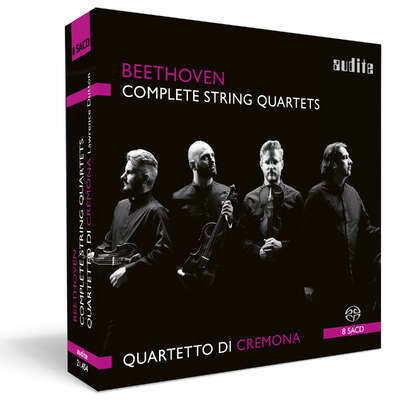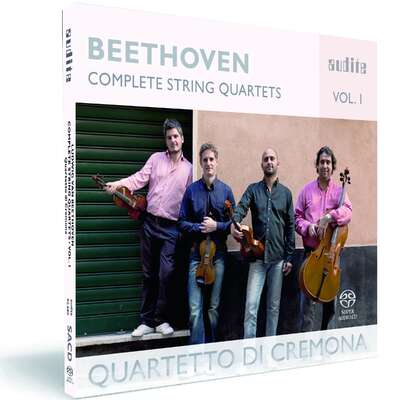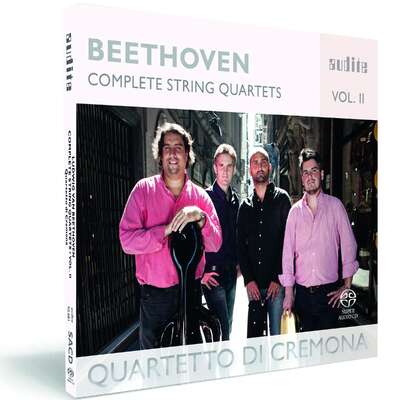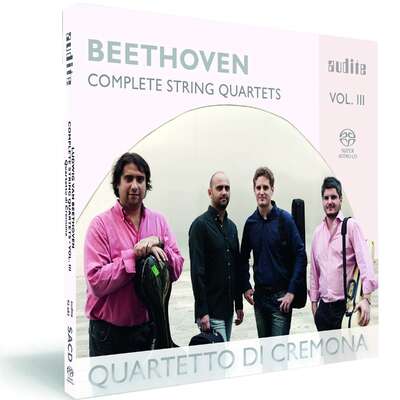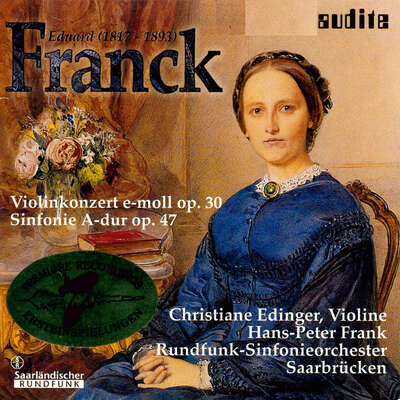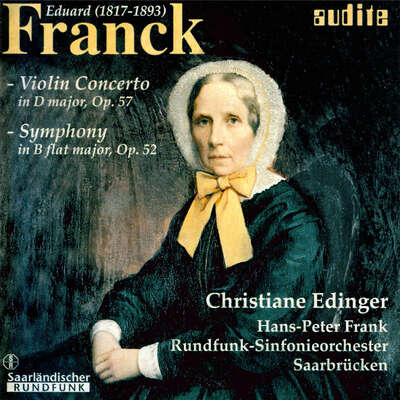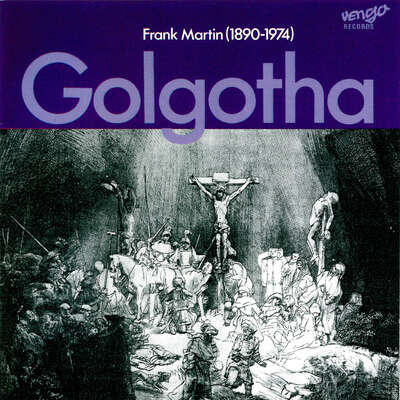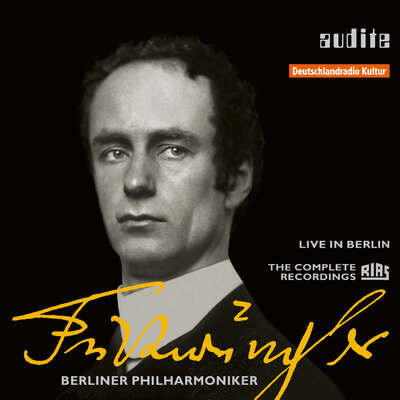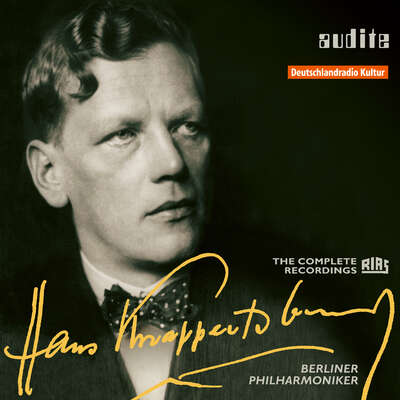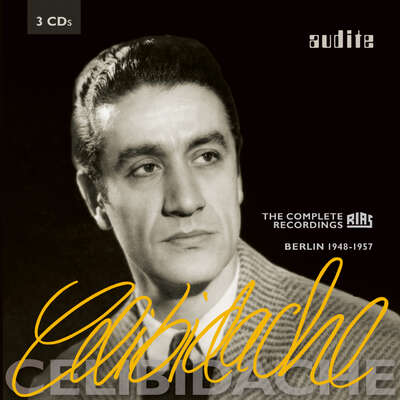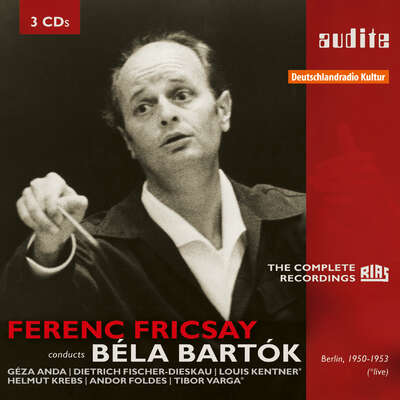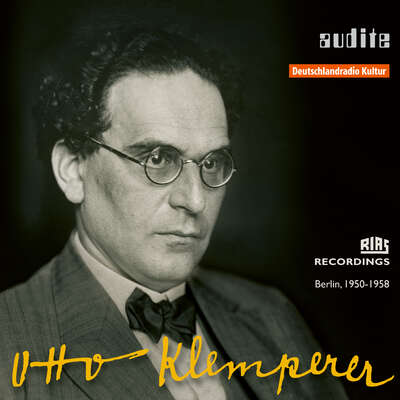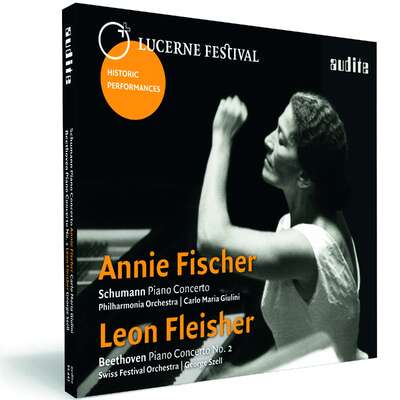
Christian Ferras war einer der markantesten Repräsentanten der franco-belgischen Violinschule. Die vorliegende Studioproduktion entstand im Jahr 1951 aus Anlass seines sensationellen Debüts mit den Berliner Philharmonikern unter Karl Böhm mit Beethovens Violinkonzert. Ferras gehörte auch zu den maßgeblichen Interpreten des Violinkonzertes von Alban Berg, wie die hoch emotionale Live-Aufnahme mit dem Radio-Symphonie-Orchester Berlin eindrucksvoll belegt.mehr
Christian Ferras war einer der markantesten Repräsentanten der franco-belgischen Violinschule. Die vorliegende Studioproduktion entstand im Jahr 1951 aus Anlass seines sensationellen Debüts mit den Berliner Philharmonikern unter Karl Böhm mit Beethovens Violinkonzert. Ferras gehörte auch zu den maßgeblichen Interpreten des Violinkonzertes von Alban Berg, wie die hoch emotionale Live-Aufnahme mit dem Radio-Symphonie-Orchester Berlin eindrucksvoll belegt.
Details
| Christian Ferras plays Beethoven and Berg Violin Concertos | |
| Artikelnummer: | 95.590 |
|---|---|
| EAN-Code: | 4022143955906 |
| Preisgruppe: | BCB |
| Veröffentlichungsdatum: | 28. Oktober 2011 |
| Spielzeit: | 72 min. |
Zusatzmaterial
Informationen
Christian Ferras (1933–1982) gehörte mit Jacques Thibaud, Zino Francescatti und Ginette Neveu zu den großen Geigern, die das Bild von der franco-belgischen Violinschule maßgeblich prägten – einer Kunst des Geigenspiels, mit der man Sinnlichkeit, Eleganz und klangliche Raffinesse verbindet. Nach seinem Debüt in Paris 1946 mit der „Symphonie espagnole“ von Édouard Lalo und dem Violinkonzert von Beethoven gelang Ferras der Sprung in die internationale Karriere. Zusammen mit dem Pianisten Pierre Barbizet bildete er ein kongeniales Duo, das drei Jahrzehnte bestand, seine Zusammenarbeit mit Herbert von Karajan und den Berliner Philharmonikern in den sechziger Jahren markierte den Höhepunkt seiner Karriere. Mit den Berliner Philharmonikern hatte Ferras bereits 1951 debütiert. Unter der Leitung von Karl Böhm spielte er im Titania-Palast das Beethovenkonzert. Aus diesem Anlass entstand in der Berliner Jesus-Christus-Kirche auch die vorliegende Studioproduktion. Es ist faszinierend, mit welcher Tonschönheit und souveränen Ruhe der erst 18-jährige Ferras den Solopart aussingt. Ein Live-Mitschnitt von 1964 mit dem Radio-Symphonie-Orchester Berlin unter der Leitung des italienisch-amerikanischen Dirigenten Massimo Freccia gibt eindrucksvoll Auskunft darüber, wie Ferras das Violinkonzert von Alban Berg auffasste: als ein primär romantisches Werk, das er mit hochexpressiver Tongebung bezwingend zur Wirkung bringt.
Ferras Karriere nahm eine tragische Wendung, als Ende der 1960er Jahre seine Probleme mit Depressionen und Alkohol begannen und er sich zunehmend vom Konzertleben zurückzog. 1975 nahm er ein Angebot für eine Professur am Pariser Konservatorium an und trat in den folgenden Jahren nicht mehr öffentlich auf. Ferras kehrte im März 1982 noch einmal auf die Konzertbühne zurück, nahm sich aber nur drei Wochen nach seinem letzten Konzert am 25. August 1982 im Alter von 49 Jahren das Leben.
Zu dieser Produktion gibt es einen „Producer’s Comment“ vom Produzenten Ludger Böckenhoff.
Die Produktion ist Teil unserer Reihe „Legendary Recordings“ und trägt das Qualitätsmerkmal „1st Master Release“. Dieser Begriff steht für die außerordentliche Qualität der Archivproduktionen bei audite, denn allen historischen audite-Veröffentlichungen liegen ausnahmslos die Originalbänder aus den Rundfunkarchiven zugrunde. In der Regel sind dies die ursprünglichen Analogbänder, die mit ihrer Bandgeschwindigkeit von bis zu 76 cm/Sek. auch nach heutigen Maßstäben erstaunlich hohe Qualität erreichen. Das Remastering – fachlich kompetent und sensibel angewandt – legt zudem bislang verborgene Details der Interpretationen frei. So ergibt sich ein Klangbild von überlegener Qualität. CD-Veröffentlichungen, denen private Mitschnitte von Rundfunksendungen oder alte Schellackplatten zugrunde liegen, sind damit nicht zu vergleichen.
Besprechungen
ClicMag | N° 10s Novembre 2013 | Jérôme Angouillant | 1. November 2013
Cet enregistrement en studio publié par Audite marque le début de la carrière internationale du violoniste et suit deux concerts qu'il donna à Berlin du concerto Op.61 de Beethoven, à l'invitation de Karl Böhm.Mehr lesen
hifi & records | 4/2012 | Uwe Steiner | 1. Oktober 2012
Als der 18-jährige Christian Ferras 1951 in Berlin bei den PhilharmonikernMehr lesen
klassik.com
| 21.08.2012 | Johannes Knapp | 21. August 2012 | Quelle: http://magazin.k...
Dem Andenken eines Bengels
Beethoven, Ludwig van – Violinkonzert in D-Dur
Die wiederveröffentlichte Aufnahme zweier Meilensteine der GeigenliteraturMehr lesen
www.klavier.de
| 21.08.2012 | 21. August 2012
Dem Andenken eines Bengels
Beethoven, Ludwig van: Violinkonzert in D-Dur
Die wiederveröffentlichte Aufnahme zweier Meilensteine der GeigenliteraturMehr lesen
Die Rheinpfalz | Nr. 174 (Samstag, 28. Juli 2012) | kkch | 28. Juli 2012 Berg: Violinkonzert mit Christian Ferras
Mit Christian Ferras (1933-1982) sind so viele Aufnahmen von BergsMehr lesen
Diapason | N° 602 Mai 2012 | François Hudry | 1. Mai 2012
CD émouvant à plus d'un titre! D'abord parce qu'il permet d'entendre le jeune Christian Ferras dans deux interprétations solaires des concertos deMehr lesen
Christian Ferras, encore sous le coup de la disparition de son maître bien aimé Charles Bistesi, y déploie un climat unique, élégiaque, merveilleusement suivi, écouté par le grand chef et par les musiciens. Il règne dans cet enregistrement une étonnante ferveur, comme si la présence du jeune Français parmi les Berlinois, au cœur de leur ville en ruines, venait panser les blessures de la guerre, et sceller la réconciliation franco-allemande sous l'égide de Beethoven l'universel. Les phrasés de Ferras sont larges, l'engagement total, l'articulation –la diction – souveraine. Et que dire du climat quasireligieux du Larghetto! Voilà un jeune artiste habité, qui tire une sonorité lumineuse d'un instrument pourtant modeste, bien avant de pouvoir acheter son premier Stradivarius. Un miracle de chant, de gravité, de hauteur de vue; un rendez-vous sur les cimes à comparer avec le concert donné la veille au soir par les mêmes interprètes (Tahra).
Ferras aimait beaucoup le Concerto «A la mémoire d'un ange», dont on découvre ici une troisième version live (1964), après celles de 1957 (Ansermet, Claves) et 1960 (Keilberth, Testament ou Orfeo). Avec l'Orchestre de la Radio de Berlin et Massimo Freccia, son archet frémissant d'humanité et lyrique nous captive de bout en bout. Impossible de donner un ordre de préférence à ce tiercé où le violoniste reste si fidèle à lui-même.
Fanfare | 01.05.2012 | Robert Maxham | 1. Mai 2012
Audite’s program of violin concertos by Ludwig van Beethoven and Alban Berg captures two moments in the life of Christian Ferras, the first a studioMehr lesen
The live reading of Alban Berg’s Concerto came more than a decade later, when Ferras had not quite yet reached the age of 33. Ferras’s recording of the concerto, paired with Igor Stravinsky’s, appeared on Claves SO-2516 in a live performance from Geneva in 1957 with Ernest Ansermet and the Suisse Romande Orchestra, Fanfare 32:4 (he would record the work in the studio in 1963 with Georges Prêtre and the Paris Conservatory Orchestra). Although the timings of the first section differ by only a few seconds between live performances, the later one with Massimo Freccia seems more forward-moving (I noted the almost static quality of the earlier reading in my review in 32:4), although both parts of the first movement nevertheless sound moody, if not gloomy—and atmospheric, if not surreal—in this reading with Freccia, and the engineers have captured it with striking fidelity. Listeners who remember the powerful effect of recordings of Berg’s Concerto by Arthur Grumiaux (from 1967, reissued on Decca Eloquence 480 0481, Fanfare 34:1), and André Gertler (reissued on Hungaroton 31635) might begin to wonder whether the Franco-Belgian manner might not, perhaps paradoxically, be uncannily suited to Berg’s temperament. The last page of the end of the first movement epitomizes the dreaminess yet desperation that Ferras manages to project. He’s equally at home in the tumult of the second movement’s opening section, representing the violin’s part in the catastrophe with ferocious intensity and the moments of remission with eerie calm. In the final section, based on one of Bach’s most chromatically harmonized chorales, he ascends from moments that seem intentionally lethargic, to reach a shattering conclusion and a sublimely untroubled dénouement. Massimo Freccia seems to share Ferras’s view of the concerto’s dramatic design, not only overall but in detail.
Despite the unquestionable depth and technical command evidenced in these readings, Ferras never became a household name in the United States, even among violinists, and several reference works give him only scant if any mention. Still, it’s hard to imagine that these recordings could sound too French, or too slick, or, in fact, too anything, to capture listeners’ imagination. And perhaps now the reissue of recordings like these will give collectors something to treasure, thereby effectively offering him a second chance at the general fame he seemed to deserve. Urgently recommended, as a recording of special merit.
Das Orchester | 04/2012 | Bernhard Uske | 1. April 2012
Zwei Geiger haben zu Ludwig van Beethovens Violinkonzert denMehr lesen
Crescendo Magazine | 01.03.3012 | Bernard Postiau | 1. März 2012
Les témoignages de Christian Ferras sont suffisamment rares que pour faireMehr lesen
American Record Guide | 01.03.2012 | John P. McKelvey | 1. März 2012
If you like your Beethoven slow and incomparably well-played you’ll find this release a real treat, indeed a thrilling experience, one of theMehr lesen
One end of the spectrum of recordings of the Beethoven concerto is anchored in a famous Heifetz/Toscanini performance with the NBC Symphony, made about 1937 in the utterly dead studio 8H in RCA’s New York facilities. At about 36 minutes, it must also be the fastest, and though Heifetz was technically perfect, the sound kills it. It was the first recording of the work I ever owned, and in the light of 65 years of listening, has to be the worst.
If Toscanini was the fastest, Karl Böhm at 48 minutes is by far the slowest performer, slower by far than Furtwängler and Menuhin in their fine account (four minutes faster than this one). If it weren’t for the level of tension and commitment attained and maintained by everyone involved, it would be a ridiculous flop. Instead, it is flat out the finest account of this difficult work I’ve ever heard. Ferras, then at the ripe age of 18, plays at a level of intensity as well as flawless execution and intonation I could hardly imagine possible. He was at this time at the zenith of his career, one later disrupted by drug and alcohol addiction, and problems of personality—ending in suicide at age 40. Audite’s restoration has brought forth sound of remarkable clarity—perfect in equalization, absolutely free from noise and distortion. It’s a remarkable sonic restoration. The Berlin Philharmonic of the time was Furtwängler’s group, a highly refined and flexible ensemble. Its performance here is, under his friend Böhm, superb.
There is one problem, however, and it is the fault of the original engineers, who carelessly omitted the initial section where the themes are introduced at the beginning of I. It is to be repeated note by note, though this performance, as recorded, omits the first statement entirely—roughly a bit more than one minute of music. Of course, the missing section could easily have been copied and dubbed in, but the producers feared that an exact repetition would not have captured the nuance and total integrity of the performance as a whole. So they left it out. It does not make all that much difference, and unless you’re listening critically, you may not even notice it, but if you’re ruthlessly committed to perfection, you’ll have to copy it and insert it yourself. I have the equipment to do this easily, but I’m not planning to do it.
I had a faint recollection of another performance, somewhere in my archives, that bore some imperfectly perceived and half-remembered connection to this one. I searched my uncatalogued and haphazardly shelved archives, and after a while came on a CD recording of the Beethoven concerto on Urania played by (guess who) Ferras and Böhm with the excellent Frankfurt Radio Orchestra, recorded at about the same time as the Audite! Trembling with excitement I fed it to my player and was rewarded to hear another great performance of this music, with both sections of the introduction in place, and perfectly played. The tempos are also slow, though at 46 minutes they are slightly faster than in the Audite recording. The same high level of interpretation and execution is nevertheless achieved. I’m afraid that recording may be difficult to come by, since the Urania label expired several years ago. Still, copies may be around online or from other archival sources. There are other fine performances of the music by Menuhin, Oistrakh, Fritz Kreisler, Szigeti, Milstein, and others too numerous to mention. I must suggest, however, that this recording excels all its competitors.
The same high level of interpretation and execution can be heard in the accompanying recording of Alban Berg’s concerto, with the RIAS orchestra led by Massimo Frescia, though its effect is somewhat less smashing if only because Berg’s concerto, fine as it undoubtedly is, isn’t quite as monumental as Beethoven’s. Nevertheless what is heard is not excelled by any other recorded performance of it that has come my way. A splendid accompaniment is also a substantial asset.
The CD is packaged in an attractive case with extensive notes and commentary, to top off one of the most remarkable musical experiences that has ever come my way. Don’t even think about it, just get it.
www.opusklassiek.nl | februari 2012 | Aarnout Coster | 1. Februar 2012
Dertig jaar geleden overleed de Franse violist Christian FerrasMehr lesen
Classica | n° 139 février 2012 | Stéphane Friédérich | 1. Februar 2012
Restituée par Orfeo, la prise de son de la Radio autrichienne (live duMehr lesen
Gramophone | February 2012 | Rob Cowan | 1. Februar 2012
REPLAY – Rob Cowan's monthly survey of reissues and archive recordings
Important first releases – Brahms from Barbirolli in the new Coventry Cathedral and in Boston • A feast from Christian Ferras
Recordings of performances with a dark historical backdrop are fairly plentiful – think of Václav Talich conducting Má vlast in Nazi-occupiedMehr lesen
Coincidentally the Barbirolli Society has released another live Brahms Second, recorded at Boston's Symphony Hall with the city's Symphony Orchestra, part of a concert given three years before the one from Coventry. It's likely that the faster overall pace in Boston is due at least in part to the drier acoustic and the reduced need to avoid converging lines. Still, the effect is quite different, more silken and energised, though the underlying warmth remains. The rest of the programme is fascinating; in fact, we're offered two versions of it: one from January 30, 1959, the other from January 31 (with radio announcements and in marginally inferior sound). Barbirolli's own Elizabethan Suite features superb strings and horns in 'The King's Hunt', there's Delius's The Walk to the Paradise Garden (rather more restrained than expected), and a colourful reading of Wait on's Partita. All the recordings are in stereo.
Another comparison arrives, again involving Testament, which has released a Berlin Philharmonic Concert given at the Salzburg Festival in August 1960 under the direction of Joseph Keilberth. The main item is Bruckner's Ninth Symphony and anyone who recalls Keilberth's 1956 Telefunken recording with the Hamburg State Philharmonic will already know that he had the full measure of the work (that same recording was reissued on CD bizarrely coupled with part of Bruckner's Te Deum!). Prior knowledge of that recording will not, however, prepare you for the impact of this live performance which, in a word, is stunning, the Berlin brass presenting a welter of tone, powerfully projected, the Adagio's crowning peroration as devastating as any on disc – and I do mean any! If perchance you need convincing that Keilberth could come up with the goods in symphonic music, then look no further. The couplings are a buoyant account of Schubert's Rosamunde Overture and Alban Berg's Violin Concerto with Christian Ferras as the soloist, an occasionally rough-edged performance full of intense expression but which doesn't quite gel as an entity. Turn then to a broadcast performance put out by Audite from four years later, when a more mature Ferras was partnered by the Berlin Radio Symphony Orchestra under Massimo Freccia (a Franz Schalk pupil), and the overall impression is of a performance that's more confident, more skilfully shaped from the rostrum (the work's rhythmic aspects come across with greater clarity), and interpretatively better integrated. As to Audite's coupling, Ferras's 1951 Berlin Philharmonic recording of the Beethoven Concerto under Karl Böhm is the work of a precociously gifted teenager; yet, rather than opt for outward virtuosity, Ferras really plumbs the depths, his playing invariably quiet and softgrained, with some daringly broad tempi yet with real bite in the finale. Böhm's conducting is a model of discreet accompanying, with a firm pulse, neatly pointed phrases in the outer movements and a warmly sustained Larghetto. But there's a significant problem in that the surviving tape, although perfectly adequate sound-wise, lacks the opening measure of the Larghetto. The solution would have been easy: just record the surviving second measure and repeat it (they're musically identical) but, no, Audite decided that this would have invalidated the recording's authenticity. Personally, I would have copied the motif, but there you are ... you can't complain that the people at Audite lack musical integrity.
Hi-Fi News | February 2012 | CB | 1. Februar 2012
The Berg Concerto was central to Christian Ferras’s repertoire. His EMI version is no longer listed here but – like the 24 London bus – threeMehr lesen
Diverdi Magazin | febrero 2012 | Roberto Andrade | 1. Februar 2012
Como caído del cielo
Los conciertos de violín de Beethoven y Berg por Christian Ferras dirigido por Karl Böhm y Massimo Freccia, en Audite
Entre 2003 y 2004, Testament editó tres CDs que incluían grabaciones EMI y Decca realizadas en los años 50 por Christian Ferras (1933-1982) en losMehr lesen
Ferras era por entonces la admiración del mundo musical, no solo en Francia. Su paisano y colega Jacques Thibaud afirmó, en síntesis, que poseía tres cualidades, corazón, inteligencia y dedos, que le situaban en lugar de privilegio entre los violinistas de la época, no precisamente escasa en nombres fuera de serie (¿recuerdan? Se llamaban Oistraj, Heifetz, Menuhin, Milstein...). A los 18 años Ferras era ya un artista completo. Su sonido bellísimo, suave, de esmalte precioso y timbre penetrante, engalanado con atractivo vibrato, se plegaba como un guante a un fraseo que era el colmo de la naturalidad y la elegancia, siempre lírico y cantable, que enriquecía con todo tipo de matices dinámicos y de color. Su Beethoven era impecable musicalmente, espontáneo y fascinante, como caído del cielo. Böhm era – apenas hace falta decirlo – una autoridad en la materia y un óptimo colaborador, atento siempre al equilibrio con el solista. De la orquesta no es preciso hablar.
El Allegro inicial camina a tempo moderado, lo que permite al solista extremar la vigilancia sobre la afinación, crítica en este movimiento – en su versión 15 años posterior con Karajan para DG, Ferras tiene problemas, ausentes en 1951. En el Larghetto, la duración de II minutos parece un poco excesiva, aunque el bellísimo canto de Ferras nos transporta a otro mundo en el que el tiempo no parece existir. Muy animado el rondó. Las cadencias son las de Kreisler. En conjunto, una espléndida versión, testimonio de una madurez artística que deja boquiabierto.
El CD se completa con una versión live del Concierto de Alban Berg, favorito del violinista, que lo grabó para EMI en 1963 con Georges Prêtre y del que se conservan, al menos, otras dos interpretaciones en vivo, con Ansermet y con Keilberth (Orfeo, crítica en el Boletín 210). La bellísima obra debió tener una significación especial para Ferras, que se deja el alma cuando la toca. Su excelente colaborador al frente de la RIAS-SO fue Massimo Freccia (1906-2004), interesante director italiano de quien los aficionados veteranos acaso recuerden alguno de sus buenos discos grabados por RCA para la colección que distribuía Selecciones del Reader's Digest. La Wikipedia proporciona amplia información de su polifacética biografía que bien merece conocimiento. Tal vez haya ocasión de comentar en el futuro alguno de sus registros. Como de costumbre en Audite, buen trabajo de reprocesado y muy informativas notas de carpetilla.
Diario de Sevilla | Sábado 21 de enerode 2012 | 21. Januar 2012 Serenidad y éxtasis
Christian Ferras (1933-1982) fue un eximio representante de la escuelaMehr lesen
BBC Radio 3 | 03.12.2011, 10.20 Uhr | Andrew McGregor | 3. Dezember 2011 BROADCAST Building a Library
Sendebeleg siehe PDF!Mehr lesen
Classical Recordings Quarterly | 01.12.2011 | Leslie Gerber | 1. Dezember 2011
Like all long-time record collectors I have been aware of Christian Ferras, and over the years I have heard a few of his LPs and generally admired hisMehr lesen
The violinist playing the Beethoven Violin Concerto on this release was only 18 years old, a good decade younger than at the time of his commercial recording with Karajan. He plays with remarkable poise and maturity, and collaborates intelligently with the orchestra rather than battling it for domination.
The sound quality of the 1951 recording is surprisingly fine for its date, even knowing that it originates from broadcast master tapes. The performance may not supplant those of such geniuses as Szigeti, Grumiaux, or Busch, but it is definitely worth hearing. The opening phrase of the second movement is missing from the existing tape but that is a very minor problem.
Ferras made an EMI recording of the Berg Concerto with the Paris Conservatoire Orchestra and Georges Prêtre (there is also another live version with Ansermet and the Suisse Romande Orchestra on Claves). As I recall it was orchestrally superior to this 1964 live performance. Ferras plays fervently here, similarly to what I recall from the EMI version, concentrating more on the lyrical than the spiky qualities of the music. It's interesting to hear Freccia, the one-time conductor of the Baltimore Symphony Orchestra, who died in 2004 at the age of 98. He was completely at home in twentieth-century music, having been introduced to Dallapiccola and other Italian modernists when he was only 17, and although the orchestra isn't world-class Freccia has it making sense out of somewhat challenging music.
Not a compelling issue for the general collector, perhaps, but violin afficionados may find it worth having and devotees of Ferras will be delighted at the chance to hear newly discovered performances of major works.
Pizzicato | N° 218 - 12/2011 | RéF | 1. Dezember 2011 Ferras mit Beethoven und Berg
Und wenn es nur darum ginge, zu beweisen, dass das Duo Ferras-Karajan in Beethovens Violinkonzert 1967 besser funktionierte als Ferras-Böhm 1951,Mehr lesen
Die Interpretation des Alban-Berg-Konzerts ist hier im ersten Satz zwar weniger poetisch, nicht so introspektiv, im zweiten brillanter und rhetorischer als in der Live-Aufnahme von Orfeo, die ebenfalls in diesem Heft besprochen wird.
Audiophile Audition | November 27, 2011 | Gary Lemco | 27. November 2011
Christian Ferras, v. = Concertos of BEETHOVEN & BERG – Audite
The tragically doomed and extraordinarily gifted Christian Ferras appears in two concertos deeply ingrained in his personality, here restored in excellent sound.
The sublime violin artistry of Christian Ferras (1933-1982) still compelsMehr lesen
Märkische Oderzeitung | Freitag, 18. November 2011 | p.p. | 18. November 2011 Legendäres Debüt mit Macke
Ooops, denkt der Hörer und spielt den zweiten Satz gleich noch mal an.Mehr lesen
Frankfurter Allgemeine Zeitung | 12.11.2011 | 12. November 2011
Kurzer Nachtrag, betreffs Beethovens Violinkonzert: Zwar ist das AlteMehr lesen
www.classicstodayfrance.com | 10/2011 | Christophe Huss | 1. Oktober 2011
Cette bande originale du Concerto de Beethoven qui marque les débuts de Ferras à Berlin 1951 est dans un état de conservation sonore admirable. Ferras a 18 ans et son insolence sonore donne la chair de poule.Mehr lesen
